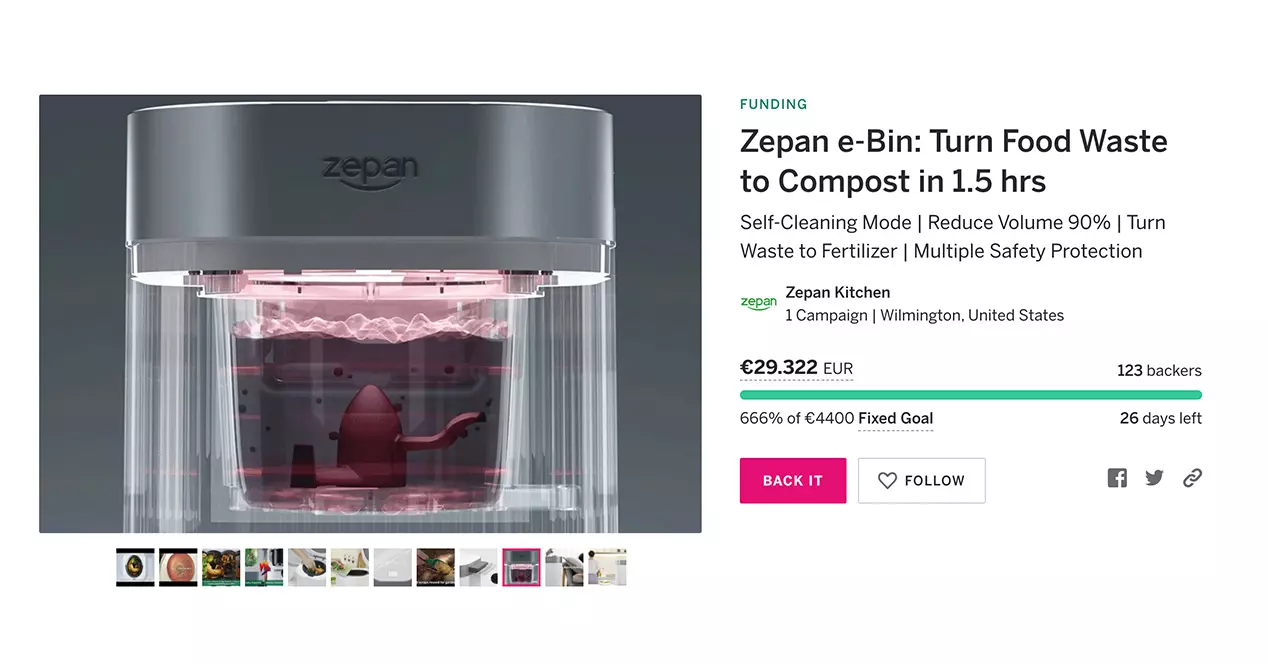
The smart trash can is here
This state-of-the-art trash can says decompose and reduce the volume of organic waste of the kitchen by more than 90%. The resulting product is odorless, hygienic and dry. It helps reduce the emission of methane and CO2 that causes food scraps to be sent to the landfill, they say. Once processed, the resulting product is perfect as compost for the garden. But … is that possible?
Zepan e-Bin, the bucket that creates «compost»
It sounds very nice, turn your garbage into natural compost in just a few hours. However, anyone who has spent time in the garden will know that the natural composting process differs from what the e-Bin does.
To get started, a composter does not need state-of-the-art technology. In fact, the Internet is full of tutorials showing how to make a vermicomposter with recycled polystyrene fridges. It is thrown away, even children do it at the school farm. Here we can see an example of a youtuber skilled.
Let’s see how e-Bin processes waste, comparing it with the compost creation process:
- In the first step, the bin increases the temperature and dehydrates organic remains.
- Once dry, the pulverize with its blades maintaining the temperature.
- When it has reduced its volume, sterilize the product with UV radiation.
This resulting matter, although very easy to dispose of and handle without odors, is not compost.
So why is e-Bin advertised as a composter?
In short, yes, we can affirm that it is misleading advertising. Zepan Kitchen, in addition to being more than inspired by the corporate image of Vorkwerk to make its products look like first cousins of the Thermomix, is making a play on words in its campaign of crowdfunding. The key is in the word decompose.
Always look at all the dictionary definitions. Although decompose It can be translated into Spanish as ‘decompose’, it also means ‘disintegrate’. And is that to create compost or compost, a biochemical decomposition of organic remains until they become humus. E-Bin does only physical process.
How do you compost?
To decompose organic remains into inorganic matter that plants can easily assimilate, they need water and decomposers. Not only the famous worms, but also bacteria and other microorganisms. Mushrooms and mealybugs are also decomposers.
These organisms need a high humidity level and an ideal temperature to process all nutrients and convert them into simpler chains. To do this, they also need carbon (dry plant matter) and nitrogen (for example, ruminant manure).
The e-Bin, by dehydrating and sterilizing organic waste, it is not breaking them down beyond reducing them in volume. What’s more, it has destroyed the organisms that break down food with UV radiation. Unless you rehydrate and add external microorganisms, the product resulting from the e-Bin is not suitable fertilizer for any plant.
Does it pay to buy the e-Bin?
It is tempting. We all are lazy to go down to throw out the garbage, it is an operation for which human beings are not designed. But of course, the e-Bin is not cheap. It has a minimum price of 300 dollars and you need to use a filter carbon disposable a month it’s worth $ 13. Come on, it is neither cheap nor ecological.
We will continue to wait for the electronic vermicomposter. For now it is cheaper to buy a silk robe with matching slippers to look handsome to take down the trash every night.



